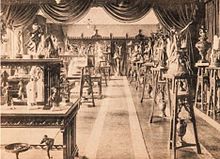Edmond Etling
Edmond Etling | |
|---|---|
| Born | Edmond Laurent Etling 23 June 1878[1] Paris, France |
| Died | around 1940 |
| Occupation(s) | Art dealer, gallery owner, designer, manufacturer |
| Movement | Art Deco |
Edmond Laurent Etling (23 June 1878 – around 1940) was a French art dealer, gallery owner, designer, and a manufacturer of high-quality decorative objects made of bronze, ceramics and art glass in the Art Deco style.[2]
Etling was born in Paris, the son of Cerf Etling and Valerie Dreyfus.[1]
He owned La Societe Anonyme Edmond Etling (English: Edmond Etling Limited Company) for manufacturing, his foundry was named Edmond Etling & Cie, and sometimes the products are referred to as "Etling Glass". His gallery, Galerie Béranger, was located Paris (however there are discrepancies on the exact address).[3][4]
Biography

His company La Societe Anonyme Edmond Etling, founded in Paris in 1909,[5] manufactured decorative object and commissioned sculptors and artists, including Georges Béal,[5][6] Demétre Chiparus,[4] Claire Colinet,[4] Armand Godard,[5] Geneviève Granger,[5] Marcel Guillard,[5] Maurice Guiraud-Rivière,[4] Géza Hiecz,[5] Fanny Rozet,[4] and Lucille Sévin.[5] Other artists worked with Etling when casting their statuettes including Aurore Onu, Marcel Bouraine, Pierre Le Faguays,[7] Raymonde Guerbe, and André Vincent Becquerel.
Etling is known for light blue opalescent objects such as plates and bowls, which were also produced in gray and frosted glass.[5] Most items bore the cast signature "Etling France" followed by a model number related to the Choisy-le-Roi catalogue.[8]
In 1910, Etling was awarded the diplome d'honneur at Brussels International (1910).[4] In 1923, he was awarded the Grand Prix in Paris.[4] In 1940, Etling closed his shop due to World War II.[5] Because Etling was of Jewish descent, he was sent to a Nazi concentration camp, where he died.[5]
In the 1970s, the Manufacture Royale de Porcelaine de Sèvres reproduced some Etling designs, particularly the female nudes.
See also
- Art Deco in Paris
- International Exhibition of Modern Decorative and Industrial Arts
- Paris between the Wars (1919–1939)
- Joh. Loetz Witwe, art glass manufacturer
- Lalique
References
- ^ a b Paris, France, Births, Marriages, and Deaths, 1555–1929
- ^ Cappa, Giuseppe (1998). Le génie verrier de l'Europe: témoignages : de l'historicisme à la modernité (1840-1998) (in French). Editions Mardaga. pp. 251–254. ISBN 978-2-87009-680-2.
- ^ "Edmond Etling". ReArtDeco. Retrieved 2022-09-27.
- ^ a b c d e f g Shayo, Alberto (25 January 2016). Statuettes art deco period. Antique Collectors Club. ACC Art Books. p. 31. ISBN 978-1-85149-824-6. Retrieved 2022-09-27 – via Issuu.
{{cite book}}:|website=ignored (help) - ^ a b c d e f g h i j "Opalescent Draped Nude (Isadora)". Mullin Automotive Museum. October 30, 2020. Retrieved 2022-09-28.
- ^ Zimmeth, K. (2005-04-09). "Frosted glass candy dish was made by a competitor of Lalique". Detroit Free Press. p. 57. Retrieved 2022-09-28.
- ^ Knowles, Eric (2014-10-10). Art Deco. Bloomsbury Publishing. pp. 70–71. ISBN 978-0-7478-1521-1.
- ^ Bowey, Angela M. (1998). "Etling Glass information, pictures and references". GlassEncyclopedia.com. Retrieved 2022-09-28.
External links
- CS1 French-language sources (fr)
- CS1 errors: periodical ignored
- Articles with short description
- Short description is different from Wikidata
- Articles with hCards
- 1878 births
- Date of death unknown
- French people executed in Nazi concentration camps
- French art dealers
- French brands
- Glassmaking companies of France
- Design companies established in 1909
- French Jews who died in the Holocaust
- 20th-century French Jews